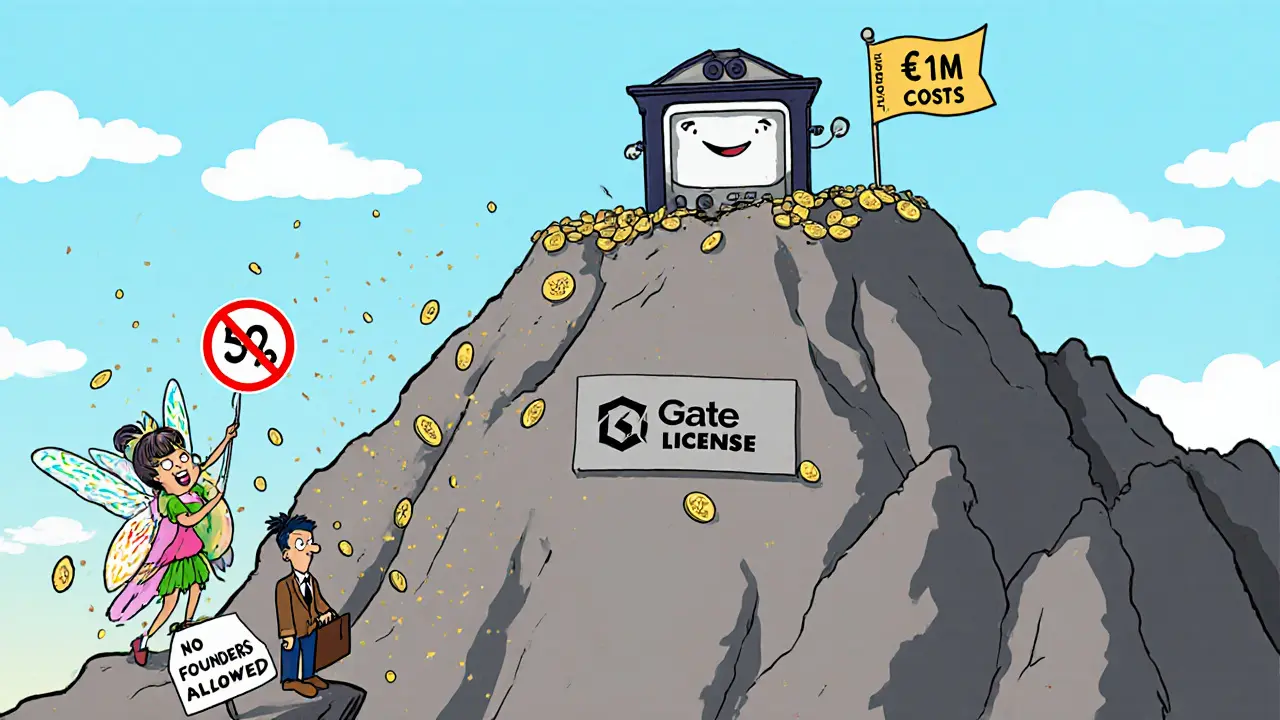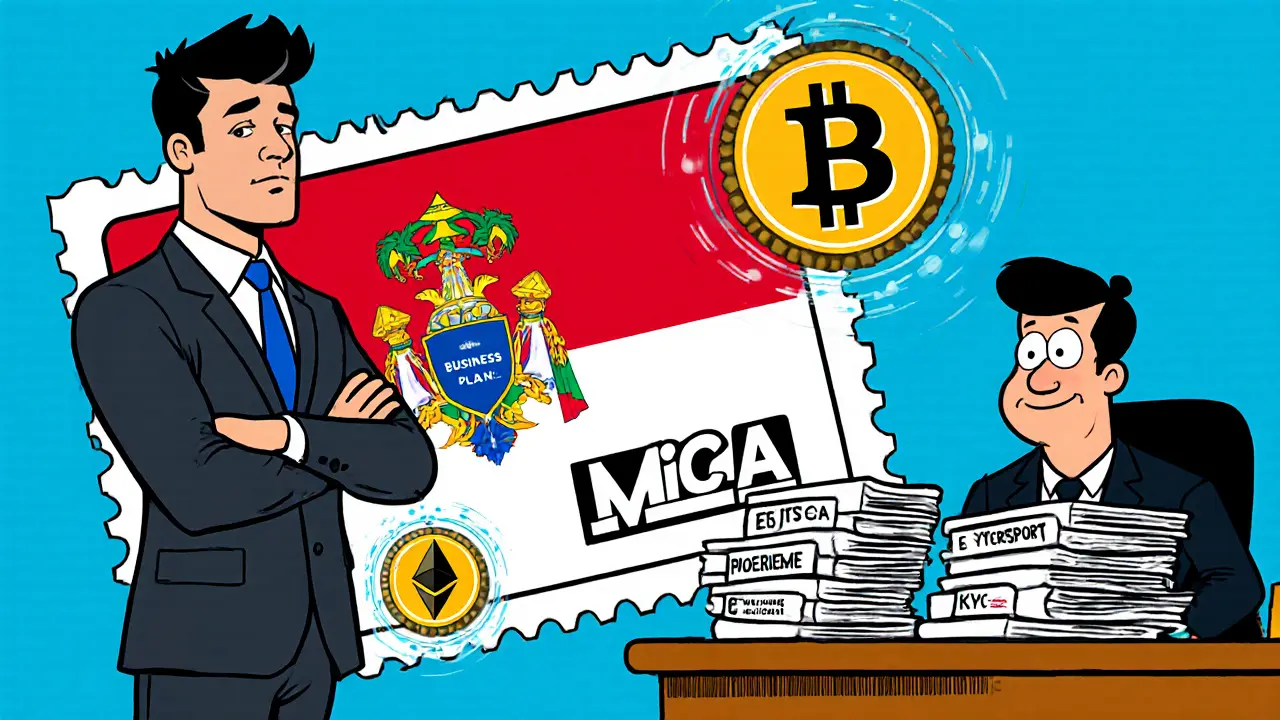MiCA Compliance Cost Calculator
Calculate Your MiCA Compliance Costs
Estimate the startup costs for a crypto exchange in Malta under MiCA regulations. Based on current industry standards and the article's data.
Setting up a crypto exchange in Malta isn’t about finding a loophole or jumping through hoops. It’s about building a business that can operate legally across the entire European Union - and that starts with one thing: a MiCA license. If you’re thinking about launching a crypto exchange, Malta isn’t just another option. It’s one of the few places in the world where you can get a license that works in all 27 EU countries. But it’s not cheap, it’s not fast, and it’s not easy. The rules are strict, the paperwork is heavy, and the bar is high. But for serious operators, it’s worth it.
Why Malta? The EU Passport Advantage
Malta’s biggest draw isn’t its beaches or its tax rates - it’s the EU passport. Once you get your MiCA license from the Malta Financial Services Authority (MFSA), you don’t need to apply for separate licenses in Germany, France, Spain, or the Netherlands. You can offer exchange, custody, and other crypto services across the whole EU with one approval. That’s huge. Other countries like Switzerland or Singapore may have simpler rules, but they don’t give you automatic access to 450 million people. Malta does.This passporting right isn’t theoretical. Gate Technology Ltd got its MiCA license on September 1, 2025, and immediately started the process of expanding into other EU markets. That’s the model: get licensed in Malta, then scale across Europe. No more dealing with 27 different regulators. No more conflicting rules. Just one license, one compliance system, one operational setup.
What MiCA Actually Covers
MiCA isn’t just a license for trading Bitcoin. It’s a full regulatory framework that defines what you can and can’t do. There are three main types of entities covered:- Crypto-asset service providers (CASPs) - these are exchanges, wallet providers, and custodians. If you’re letting people trade crypto or hold it for them, this is you.
- Issuers of asset-referenced tokens (ARTs) - stablecoins tied to fiat currencies or other assets, like EUR or gold.
- Issuers of electronic money tokens (EMTs) - digital tokens that function like electronic money, often used for payments.
If you’re running a crypto exchange, you’re almost certainly a CASP. That means you need to meet strict requirements around governance, security, capital, and transparency. You can’t just set up a website and start accepting deposits. You need a board, a compliance officer, a risk manager, and documented procedures for everything from KYC to cold storage.
The Licensing Process: What You Need to Submit
Getting licensed isn’t a form you fill out online. It’s a multi-month project that requires serious resources. Here’s what the MFSA expects:- Business plan - detailed projections, target markets, revenue models, and growth strategy. Not a one-pager. Think 50+ pages.
- Governance structure - clear roles for directors, compliance officers, and AML staff. No vague titles. Names, responsibilities, and qualifications must be listed.
- Financial resources - you need to prove you have enough capital to cover risks. Minimum is €125,000, but most applicants show much more. The MFSA looks at your projected volume, user count, and potential losses.
- Cybersecurity plan - encryption standards, penetration testing reports, incident response protocols, and audit trails. You need to show you’ve thought about hacks, insider threats, and system failures.
- Risk management policy - how you identify, assess, and mitigate operational, financial, and reputational risks. This includes how you handle market volatility, liquidity crunches, and regulatory changes.
- AML/KYC procedures - your system for verifying users, monitoring transactions, and reporting suspicious activity. You must integrate with EU-wide tools like the EBA’s AML database.
There’s no official timeline, but most successful applicants take 6 to 12 months to get approved. The MFSA doesn’t rush this. They ask follow-up questions. They request revisions. They delay if anything looks unclear. You need patience and a team that knows exactly what they’re doing.

Costs: It’s Not Just the License Fee
The license application fee is €10,000. That’s the easy part. The real cost comes from building the infrastructure to meet MiCA’s standards.- Legal and compliance consultants - expect €150,000 to €300,000 for help with documentation, drafting policies, and navigating MFSA reviews.
- Technology and security - secure custody solutions, multi-signature wallets, cold storage systems, and audit logs can cost another €200,000+.
- Staffing - you’ll need at least a CEO, CCO, CTO, AML officer, and compliance analyst. Salaries in Malta for these roles start at €70,000-€120,000 per year.
- Operational overhead - office space, insurance, ongoing audits, and regulatory reporting add another €50,000-€100,000 annually.
Total startup costs? Most serious operators budget between €500,000 and €1 million before they even open their doors. Smaller players often can’t make it. That’s why the MFSA has seen mostly established firms apply - companies like Gate Technology, Kraken, and Bitpanda. If you’re a solo founder with $50,000, you’re not ready for Malta.
Tax Rules: 35% Capital Gains, But With a Twist
Malta’s corporate tax rate is 35%, which sounds high - until you understand how it works. For crypto exchanges, profits from trading are treated as capital gains. But here’s the catch: Malta has a refund system. If you’re a Maltese company with shareholders outside Malta, you can get up to 6/7 of the tax refunded. That means your effective tax rate can drop to around 5%.Plus, Malta has over 70 double taxation treaties. If your users are in the U.S., Canada, or Japan, you won’t get hit with extra taxes on cross-border transactions. That’s a huge advantage over countries like Germany or France, where crypto profits are taxed at higher rates with no refund system.
Don’t assume the tax rules are simple. You need a local accountant who understands crypto accounting under MiCA. Transactions must be tracked by timestamp, value in EUR, and user identity. The MFSA audits these records. Mess this up, and you risk losing your license.

Who’s Already Doing It?
The success stories aren’t hypothetical. Gate Technology Ltd got licensed in September 2025 - the first major exchange to do so under MiCA. Their CEO, Giovanni Cunti, said the license gave them the credibility to expand into new markets without facing regulatory pushback. Other big names like Coinbase and Kraken are also applying. That’s not a coincidence. These companies didn’t pick Malta because it’s easy. They picked it because it’s the only place that gives them EU-wide legitimacy.Smaller operators are rare. The MFSA doesn’t reject applications outright - but they do delay them. If your governance structure is weak, your security plan is generic, or your financial projections are unrealistic, you’ll get feedback asking for revisions. Many applicants give up after the third round of questions. The ones that succeed have spent years preparing.
The Hidden Challenges
Even with a license, you’re not done. MiCA is evolving. The European Securities and Markets Authority (ESMA) keeps issuing guidance. The MFSA updates its rules every few months. You need a full-time compliance officer just to track changes.Also, there’s no public database of approved applicants. You can’t look up who’s licensed. That means you can’t easily benchmark your application against others. You’re flying blind. The only way to know what works is to hire people who’ve done it before.
And if something goes wrong - a hack, a regulatory complaint, a failed audit - the MFSA has a dedicated Crypto-Assets portal for reporting issues. But they don’t take excuses. If you’re not prepared, you’ll lose your license. Fast.
Is Malta Right for You?
Malta isn’t for everyone. If you’re a small startup trying to launch a quick crypto exchange for niche users, skip it. Go to a jurisdiction with lighter rules. But if you’re serious about building a long-term, EU-wide crypto business - one that can attract institutional clients, partner with banks, and scale safely - then Malta is the only real option.You need money. You need expertise. You need patience. But if you have those, you get something no other country can match: legal access to the entire European market under one clear, enforceable rulebook. That’s worth the cost. That’s worth the wait. That’s what makes Malta the center of gravity for serious crypto exchanges in Europe.
Can I set up a crypto exchange in Malta without a physical office?
No. The MFSA requires a physical presence in Malta. You need a registered office, local directors, and employees who can be contacted by regulators. Remote operations from outside Malta are not permitted under MiCA. Even if your team works remotely, you must have a local legal entity and staff on the ground.
How long does the MiCA license application take?
On average, it takes 6 to 12 months from submission to approval. The timeline depends on how complete your application is. If you submit incomplete documents or fail to answer MFSA follow-up questions quickly, it can take longer. Some applicants have waited over a year due to back-and-forth revisions.
Do I need to be based in the EU to get a MiCA license in Malta?
No, you don’t need to be an EU citizen or resident. But you must establish a legal entity in Malta and have a physical office there. Your shareholders can be anywhere in the world, but your operational base must be in Malta. The MFSA will verify your local presence before approving your license.
Can I operate a crypto exchange in Malta without a MiCA license?
No. Since December 30, 2024, all crypto-asset service providers operating in the EU must hold a MiCA license. Operating without one is illegal and can result in fines, asset freezes, and criminal charges. The MFSA actively monitors unlicensed activity and cooperates with EU regulators to shut down non-compliant platforms.
What happens if my MiCA license gets revoked?
If your license is revoked, you must immediately stop all crypto-asset services in the EU. You’ll be required to wind down operations, return customer assets, and notify all users. The MFSA will publish the revocation publicly, which damages your reputation. You can appeal, but during the appeal, you cannot operate. Revocation usually happens due to repeated compliance failures, fraud, or security breaches.

Rebecca Saffle
November 11, 2025 AT 07:48Malta? Please. You think this is about regulation? It’s about control. The EU is turning finance into a bureaucratic prison, and Malta’s just the warden with a nice beach view.
Rachel Everson
November 12, 2025 AT 22:40Real talk - if you’re serious about this, don’t skip the compliance team. I’ve seen too many founders think they can wing it with a lawyer and a Notion doc. Spoiler: they get rejected. Hire the right people. It’s not optional.
tom west
November 14, 2025 AT 04:20€500K minimum? That’s a joke. This isn’t entrepreneurship - it’s corporate feudalism. The MFSA isn’t licensing exchanges, they’re selling access to a cartel. The real winners aren’t the founders - they’re the consultants charging $500/hour to write the same boilerplate policies for the 20th time this year.
Michael Brooks
November 15, 2025 AT 08:12One thing people miss: MiCA’s not just about rules - it’s about trust. Institutional investors won’t touch crypto unless they know the platform isn’t a front for money laundering. Malta’s the only place that gives you that credibility without having to go through 27 separate audits. It’s expensive, but cheaper than getting frozen out of Europe entirely.
Johanna Lesmayoux lamare
November 16, 2025 AT 00:03Physical office? Yeah, that’s non-negotiable. I tried remote from Miami. Got a 3-page rejection letter that said ‘lack of local presence undermines accountability.’ Ouch.
Phil Bradley
November 16, 2025 AT 14:48Let me ask you this - if the EU needs a license to trade digital assets… what does that say about freedom? Are we now living in a world where your right to hold Bitcoin requires government paperwork? 🤔
Douglas Tofoli
November 18, 2025 AT 06:42just spent 8 months on this process… and the mfSA asked for a revised risk policy because i used ‘might’ instead of ‘shall’ 😭 i swear to god i cried in my cubicle. also, cold storage costs more than my car. 🚗💸
James Ragin
November 20, 2025 AT 00:21Don’t be fooled. MiCA is just Phase 1 of the Great Crypto Containment Protocol. Next they’ll mandate KYC on every wallet. Then they’ll track on-chain behavior. Then they’ll ban private transactions entirely. This isn’t regulation - it’s the slow-motion dismantling of financial sovereignty. And Malta? It’s the velvet glove on the iron fist.
Adrian Bailey
November 21, 2025 AT 17:47bro i applied last year, got rejected 3 times, finally got approved after hiring a maltese ex-mfsa officer. she told me ‘if your business plan sounds like a startup pitch, you’re done.’ i rewrote it like a bank prospectus - 78 pages, 12 charts, 3 appendices. they approved it in 4 weeks after that. stop trying to be cool. be boring.
Ruby Gilmartin
November 23, 2025 AT 07:07Anyone who says MiCA is ‘clear’ hasn’t read the 1,200-page ESMA technical standards. The MFSA’s guidelines contradict themselves in 17 places. I’ve seen applications get rejected because the AML officer’s LinkedIn profile didn’t match their CV. This isn’t compliance - it’s performance art.
Debraj Dutta
November 24, 2025 AT 17:20From India - I’ve watched this space for 3 years. Malta’s not for everyone, but if you want real scale in Europe, there’s no alternative. The cost is high, yes. But the ROI? A single license covering 450 million people? That’s the math. Other jurisdictions are just waiting rooms.
Atheeth Akash
November 25, 2025 AT 22:12Malta’s got good vibes but the paperwork will eat your soul 😅 i did it with a small team and it took 9 months. worth it though. now we’re live in 12 countries. no more chasing licenses. just focus on users.
Andy Purvis
November 26, 2025 AT 00:00Anyone else notice how the post avoids talking about how MiCA forces you to treat crypto like a bank product? No more DeFi, no more yield farming, no permissionless innovation. You’re not building a crypto exchange anymore - you’re building a regulated financial intermediary. That’s the real trade-off.
Joy Whitenburg
November 27, 2025 AT 06:53OMG i just got my license last week!! 🥳 the cost was insane but the first client from germany just signed on and said ‘we only work with MiCA-compliant platforms’… worth every euro. also, malta’s coffee is surprisingly good.
William Moylan
November 27, 2025 AT 22:32They say MiCA is for consumer protection. But who’s really protected? The big players. The little guys? They get crushed under the weight of compliance. This isn’t regulation - it’s a corporate takeover disguised as law. And the MFSA? They’re the gatekeepers for the new financial oligarchy.
BRYAN CHAGUA
November 28, 2025 AT 20:25One thing I’ve learned: the license isn’t the finish line - it’s the starting line. MiCA changes every quarter. You need a full-time compliance officer just to keep up. I’ve seen companies spend more on regulatory updates than on marketing. That’s the new reality.
FRANCIS JOHNSON
November 29, 2025 AT 15:28There’s a deeper truth here: we’re not just building exchanges - we’re building the legal infrastructure for a new financial era. Malta’s not perfect, but it’s the only place where the rules are transparent enough to build on. This isn’t about convenience - it’s about legacy. The question isn’t whether you can afford it… it’s whether you’re ready to be part of what comes next.
David Billesbach
November 30, 2025 AT 15:18They say ‘one license, EU-wide access.’ But have you seen the enforcement? France fined a Maltese exchange €12M for a KYC glitch. Germany blocked a custody product because their cold storage didn’t meet ‘local interpretation.’ So much for passporting. It’s a license… but only if you survive the gauntlet.
ty ty
November 30, 2025 AT 22:37So you need a million dollars to start a website? Congrats. You just joined the elite club of people who pay banks to do what Bitcoin was supposed to replace. 🤡